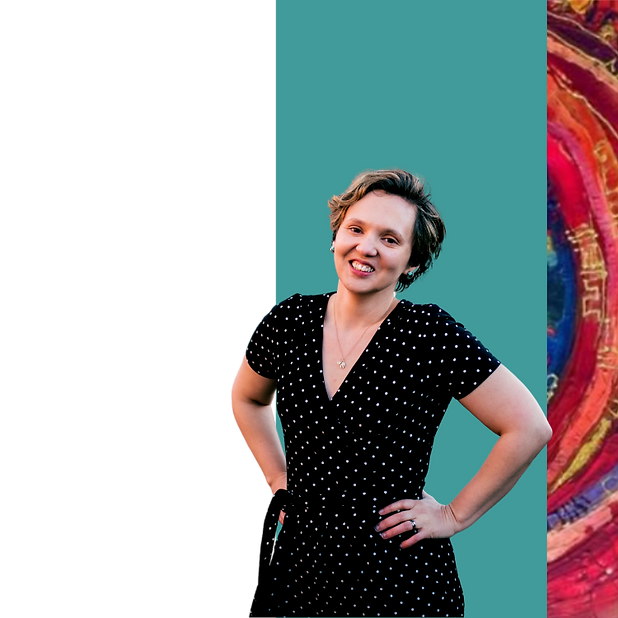_edited.png)
.png)
The thread that connects all my work is the belief that when we form connections across divides, we can build long-sighted global communities with the power to remake the harmful patterns that hold us all back.
I first experienced the power of this kind of connection while still in school, when I worked with family friends to forge a link between my community and a Ugandan counterpart, one that continues to nurture friendship and mutual support to this day.
During my time in medical school, I volunteered for a similar opportunity with a charity that focuses on empowering Kenyan children and youth to stay in school. Whilst I was carrying out research for the charity, schoolgirls confided in me about how difficult it was to stay in school during their periods. They opened my eyes to how under-supported and poorly understood menstrual health is within global health systems. In response, I funded and co-led one of the first studies investigating the links between menstrual health and girls’ school engagement.
I began my journey as a doctor and researcher, then spent nearly a decade as the founding CEO of the award-winning charity, Irise International, building the global movement for menstrual justice.
Along the way, I’ve sat on charity and campaign boards, designed thought leadership research and reports, co-created national campaigns and been a local party-political campaigner and candidate.
During this work, I began to recognise the systemic stigma and biases that created these challenges in the first place and decided to dedicate myself to building a global institution to champion menstrual justice for all. In 2014, I became the founding CEO of Irise International and spent three years in East Africa working with my colleagues to set up a sister organisation, Irise Institute East Africa.
At Irise, my approach was to build a long-term vehicle for the collective leadership of those held back by menstrual injustice.
Around this community of activists and grassroots groups, we built a network of world-class academics, civil society, funders and policymakers who could catalyse their agenda. Together, we grew Irise into a team of 20+ staff and freelancers, convening a network of 174 organisations that collaborate on advocacy and influencing work across the UK, East Africa, and globally, through a partnership with The Global Menstrual Collective.
Becoming a parent three years into my CEO-ship taught me the importance of sharing leadership and creating space for others to grow. My daughter’s name means little flame in honour of the potential we all carry within us to shape the world.
My personal high points of my time at Irise were being invited to convene on the UK government’s Period Poverty Taskforce, co-creating a campaign with UK school children that reached 791 million people (including a feature on the BBC’s Today Programme) and bringing together grassroots activists and their allies from around the world to co-create a shared vision of global menstrual justice.
We received the Power Together Award from the Global Women Political Leaders Forum in 2019 in recognition of our global movement building, and I was shortlisted for the DEFY Award, recognising disruptive leaders under 35.
By the time I handed Irise over to a new CEO in 2024, periods were no longer invisible but firmly on the global agenda. Irise had directly supported over 100,000 young people, helped 287 organisations around the world address menstrual injustice in their work, and directly shaped national policy in two countries.
.png)
Meanwhile, during the pandemic, I had started the "Lead Like A Feminist" podcast and platform with my friend and colleague, Kenyan social entrepreneur Marlene Kinyua, to bring together people who are changing the status quo. Our 8,000 followers from over 14 countries helped me see common patterns in successful social justice work.
However, as indicators of global progress began to reverse for the first time in my lifetime, the backlash against democracy and gender rights gained momentum, and the climate crisis became a lived reality, I found myself despairing of our future.
I ran my friend Nighat Basharat’s campaign for local councillor in an attempt to turn my despair into action. She lived on the council estate across the road from my house and wanted to bring her community’s voices into local council policy discussions. Although our campaign was successful, the backlash against our work was brutal. When I tried to stand for local political office myself, the polarised and toxic environment of our own party only left me feeling more hopeless.
I decided to leave my role at Irise and spend a year reading widely, thinking deeply and speaking to people all over the world, working at the crux of our failing systems.
I realised that the problem behind all our other problems was our dominant, steeply hierarchical, and individualistic approach to power, which is creating groupthink and limiting empathy on a global scale.
I saw another path to progress through building a new theory of collective power and the models and tools to make it a reality.
I began to write about and share my journey and offer consultancy to initiatives seeking to reimagine power. To date, I have worked with clients ranging from the Greater London Authority to the STOPAIDS Campaign. I joined the board of the 50:50 Parliament campaign where I am helping to build a stronger democracy in the UK and exploring expanding our work globally.
I also became a parent for a second time. I think of my son as my defiant hope baby because he was born from my rekindled belief that we can still build a safer and more sustainable world for future generations.
.png)
Now I think of myself as a Free Power Radical- someone working as part of an emerging movement to catalyse a new configuration of collective power that will enable us to rise to the urgent global challenges we face.
Some cool stuff I've done
























